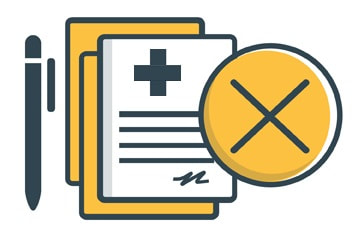Pre-Existing Medical Conditions and Life Insurance - The Definitive Guide
Whether you can get life insurance with a pre-existing condition depends on many factors - our guide explains everything you need to know to give you the best chance of success while suggesting a number of alternative options.
Updated 17 May 2023
Life insurance is primarily designed to provide a financial benefit to your family or loved ones in the case of your death. The financial benefit can help with everything from raising your children to paying off your house or replacing your income.
However, many people are intimidated by the process of buying life insurance and all of the options available to them. One of the most common questions people ask is, can I buy a life insurance policy if I am already sick? Our guide answers that question and provides additional details about what a pre-existing condition is and its impact on the life insurance policy you buy.
We cover:
Important: If you wish to talk to someone about your health and how it affects an insurance policy, we suggest the best place to start is with an insurance broker. Insurance brokers worth with a range of clients and, generally, know what policies and insurers are best suited for certain health conditions.
Know this: Before making any policy switch, it's essential to confirm that any exclusions you have on your previous policy will be covered on your new policy. This can catch people out who think they're covered but find themselves uninsured by exclusions. We are aware of New Zealanders switching policies without paying careful attention to any exclusions they may have. This has led to declined claims.
Video explainer: MoneyHub Founder Christopher Walsh explains this guide's most important facts and considerations in the video below:
However, many people are intimidated by the process of buying life insurance and all of the options available to them. One of the most common questions people ask is, can I buy a life insurance policy if I am already sick? Our guide answers that question and provides additional details about what a pre-existing condition is and its impact on the life insurance policy you buy.
We cover:
- What is a pre-existing medical condition?
- What policy might I be offered if I have a medical condition?
- Frequently Asked Questions
Important: If you wish to talk to someone about your health and how it affects an insurance policy, we suggest the best place to start is with an insurance broker. Insurance brokers worth with a range of clients and, generally, know what policies and insurers are best suited for certain health conditions.
Know this: Before making any policy switch, it's essential to confirm that any exclusions you have on your previous policy will be covered on your new policy. This can catch people out who think they're covered but find themselves uninsured by exclusions. We are aware of New Zealanders switching policies without paying careful attention to any exclusions they may have. This has led to declined claims.
Video explainer: MoneyHub Founder Christopher Walsh explains this guide's most important facts and considerations in the video below:
|
Your guide to pre-existing conditions and insurance policies is available thanks to Life Direct
|
What is a pre-existing medical condition?
A pre-existing condition is defined as a medical issue your doctor has diagnosed you with or treated you for before applying for life insurance. When you fill out an application for life insurance, you will answer questions about your health and, in some cases, may have to undergo a medical examination. This process is called medical underwriting and is designed to identify any pre-existing conditions you may have.
Life Insurance Applications - What You Need to Know:
Life Insurance Applications - What You Need to Know:
- The application will ask you about any existing medical conditions as well as any prescription drugs you may be taking. The medical exam usually includes things like measuring your height, weight, blood pressure, and pulse.
- During the exam, they may also collect blood, urine, oral fluid and take an electrocardiograph (ECG) or X-ray. Which of these are needed will depend on the insurance companies underwriting guidelines for your age and the amount of insurance you wish to purchase.
- It is critical that when answering these pre-existing health questions, you are completely honest. If you omit or do not tell the insurance company about a condition you have and they find out later, they can deny your application.
- For example, if it is uncovered that pre-existing conditions were omitted after the policy is in place, whether done intentionally or not, your coverage can be terminated. In the case of your death, the benefits may not be paid out. Insurers, if they are to cancel a policy, tend to do so within two years of your policy being issued.
What health issues do insurers identify as "pre-existing"?
Each insurance company has its own underwriting process, meaning the impact of certain pre-existing conditions on your application and policy can vary across different insurance companies. Life insurance companies will be cautious if you have one or more of the following pre-existing conditions:
- Asthma
- Cancer
- Depression
- Diabetes
- Epilepsy
- Gastroesophageal reflux disease
- High blood pressure
- High cholesterol
- HIV/AIDS
- Heart disease
- Obesity
Can I get life insurance with a pre-existing condition?
If you have pre-existing conditions, that does not necessarily mean you can’t get life insurance. The impact of your pre-existing condition depends on what condition(s) you have. There are some that will immediately exclude you from getting a policy. These are typically conditions that have a direct and immediate impact on your life expectancy.
For other conditions, it may depend on the severity of the pre-existing condition or how long ago it was diagnosed. An insurance company can take several different approaches if you have been diagnosed with a pre-existing condition. These include the following:
For other conditions, it may depend on the severity of the pre-existing condition or how long ago it was diagnosed. An insurance company can take several different approaches if you have been diagnosed with a pre-existing condition. These include the following:
- They can deny your application for life insurance.
- They can increase the rates you will pay for your life insurance policy.
- They may limit the amount of life insurance you can purchase.
- They may limit the type of life insurance you can buy (i.e. no income protection, no mortgage protection insurance)
- They may limit what you can add to your life insurance policy (long-term care, accelerated death benefit, living benefit, etc.).
What are life insurance policy exclusions?
With all life insurance policies, some general exclusions may prohibit a payout of your policy benefits in the event of your death. If you have a life insurance policy, it’s essential to know what those exclusions are to avoid surprises. Typical exclusions included in many policies include the following:
- Suicide: If the policyholder commits suicide within two years of purchasing their policy, they are not eligible for death benefits.
- Illegal activity: When someone dies due to illegal activity, they are not eligible for death benefits. This includes everything from drug deals gone wrong to DUI’s.
- Risky activity: Death due to dangerous activities like skydiving are often exclusions.
- Substance abuse: If a policyholder’s death results from drug or alcohol abuse, they are not eligible for death benefits.
- Misrepresentation: If you are found to have lied or provided any false information in your application for life insurance, you aren’t eligible for your death benefit.
What policy might I be offered if I have a medical condition?
If you have been diagnosed with a pre-existing condition, the type of policy you are offered can be different from what you originally applied for. Remember, not all pre-existing conditions mean you will be declined for coverage. The type of condition you have, if it is controlled, when it was diagnosed, the severity of the specific condition can all impact the decisions the insurance underwriter will make regarding your application and policy. The following are implications pre-existing conditions can have on the policy you are offered if they are not severe enough for you to be declined:
- You may be offered a lower death benefit
- You may be offered a different type of policy
Alternatives - What if I can’t get life insurance cover with my pre-existing medical condition?
If your pre-existing conditions cause life insurance companies to deny you coverage or for the policy offered to be unaffordable, there are still a few options you may have to get coverage:
1. Group life insurance
2. Guaranteed acceptance life insurance
3. Self-insure
1. Group life insurance
- Some New Zealand companies and government departments offer group life insurance as a benefit for employees.
- One of the advantages of a group life insurance plan is that your health status won’t determine your coverage eligibility.
- You may be limited in the amount of coverage you can get, but something is better than nothing if you have issues with pre-existing conditions.
- One disadvantage of a group life insurance policy is that you’ll lose this type of coverage if you leave your job in many cases. However, some policies allow you to convert them to individual policies if you leave your employer.
- Still, there can be restrictions put in place by the insurance companies in these scenarios.
2. Guaranteed acceptance life insurance
- Guaranteed acceptance life insurance is a type of whole life insurance that does not require a medical exam and often does not require answering medical questions.
- Unless you have a current terminal condition obtaining coverage is essentially guaranteed.
- The drawback of guaranteed issue policies is that they are much more expensive than other forms of life insurance policies and are generally only available with lower benefit amounts.
3. Self-insure
- The most popular approach is to put an existing amount of savings into a low-risk term deposit or investment fund. You can make contributions in place of what you would pay for a policy. Unless you have $100,000+ sitting around this option isn't likely to protect you as much as a standard life insurance policy. However, self-insuring is common in other areas (health insurance, pet insurance etc) and can be beneficial if you're able to regularly contribute to the fund you establish.
What can I do before applying for life insurance if I have pre-existing conditions?
If you have a pre-existing condition and are considering applying for life insurance, there are some things you can do prior to submitting an application that can increase your chances of getting the coverage you want:
Know This: There are some pre-existing conditions that you can’t change, but the things that you can you should try and change to increase your chances of being able to purchase a life insurance policy at a rate you can afford. The best way to decrease the chances of pre-existing conditions impacting your ability to get life insurance is to buy a policy when you are young and healthy.
The older you get, the more health issues that arise and the more likely you will have a pre-existing condition to deal with. In general, regardless of health conditions, life insurance is cheaper to buy when you are younger, as our guide outlines.
- Get conditions under control. If you have a condition such as diabetes, ensuring that you have it under control will significantly impact your chances. Someone with uncontrolled diabetes is viewed very differently than someone who has the condition well managed.
- Lose some weight. This is one thing that, while not always easy to do, you can control and can have a significant impact on your rates or if you can get coverage even if you have no other pre-existing conditions.
- Work on your health. For example, if you have high cholesterol, a common approach is to take time to get it under control before submitting your application for life insurance.
Know This: There are some pre-existing conditions that you can’t change, but the things that you can you should try and change to increase your chances of being able to purchase a life insurance policy at a rate you can afford. The best way to decrease the chances of pre-existing conditions impacting your ability to get life insurance is to buy a policy when you are young and healthy.
The older you get, the more health issues that arise and the more likely you will have a pre-existing condition to deal with. In general, regardless of health conditions, life insurance is cheaper to buy when you are younger, as our guide outlines.
Pre-Existing Medical Conditions - Frequently Asked Questions
Pre-existing conditions are unique and can be complicated when it comes to getting insurance - our list of common queries below helps explain what you need to know.
Can a life insurance company tell what pre-existing conditions I have from the prescription drugs I take?
Yes, underwriters are very experienced and knowledgeable regarding the drugs that are indicators of specific pre-existing conditions. They will also check a national drug database and will be able to see all of the medications your doctors have prescribed for you. For this reason, it's essential to include everything on your life insurance application.
How do I know which insurance companies may accept me with my pre-existing conditions?
The best approach is to contact an insurance broker in such cases. Working with an experienced life insurance agent is critical if you have pre-existing conditions. They are experienced with the underwriting guidelines for many insurance companies and can help you find the one that you have the best chance of being accepted with.
Are there any New Zealand-specific pre-existing conditions and life insurance regulations?
The Human Rights Act 1993 and the Contract and Commercial Law Act 2017 govern how insurance companies can use pre-existing conditions when determining your eligibility and policy terms. While insurers can decline coverage or charge higher premiums based on your health status, they must do so fairly, transparently, and without discrimination.
Can I get a joint life insurance policy with my partner if one of us has a pre-existing condition in New Zealand?
Yes, you can apply for a joint life insurance policy with your partner in New Zealand, even if one of you has a pre-existing condition. However, the pre-existing condition may affect the policy terms, such as premiums, coverage amounts, or exclusions. Therefore, it's essential to be transparent about your health status during the application process to ensure your policy remains valid.
How do pre-existing conditions affect income protection insurance in New Zealand?
Income protection insurance provides a regular income if you cannot work due to illness or injury - our dedicated guide has more information. If you have a pre-existing condition, insurers may choose to exclude that condition from your policy or charge higher premiums. In some cases, they may decline your application altogether.
Are there any life insurance policies in New Zealand specifically designed for people with certain pre-existing conditions, like cancer or diabetes?
While there may not be specific life insurance policies tailored exclusively for individuals with certain pre-existing conditions like cancer or diabetes, some insurers in New Zealand offer more flexible underwriting guidelines and coverage options for people with these conditions. Working with an experienced insurance broker can help you find a suitable policy based on your health status and needs. Their services include navigating the application process and finding an insurer that offers the most favourable terms and conditions for your situation.





